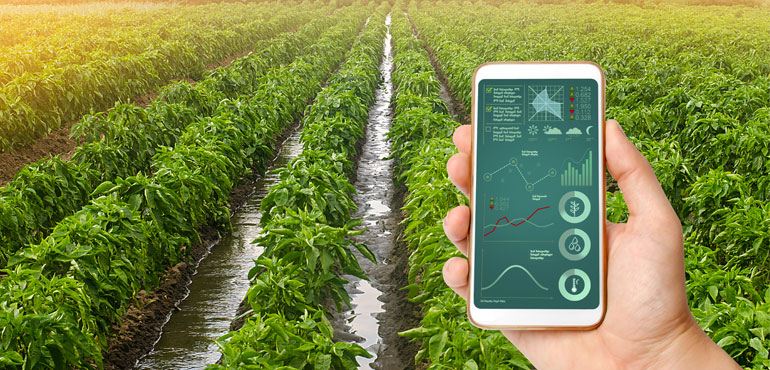Discover how cloud-based farm management software revolutionizes agri-business through efficient data analysis and decision-making. Learn more now!
Thank you for reading this post, don't forget to subscribe!Introduction
In the ever-evolving world of agri-business, the integration of technology has become indispensable for enhancing productivity and efficiency. One of the pivotal advancements in this field is the adoption of cloud-based farm management software. This technology not only streamlines farm operations but also provides crucial data insights and decision-making support. In this comprehensive blog post, we delve into the nitty-gritty of utilizing these platforms, exploring their benefits, features, and the transformative impact they have on modern agriculture
The Evolution of Agri-Business with Cloud-Based Farm Management Software
Cloud-based farm management software represents a significant leap forward for agri-business. Traditional farming practices relied heavily on manual data collection and rudimentary analysis, often leading to inefficiencies and suboptimal decision-making. With the advent of cloud technology, farmers now have access to sophisticated platforms that aggregate vast amounts of data, providing actionable insights and streamlining operations.
The emergence of cloud technology has significantly impacted various industries, and agri-business is no exception. Cloud-based farm management software offers a centralized platform that can be accessed from anywhere, providing farmers with real-time data and analytics. This transition to cloud platforms has revolutionized traditional farming practices, making them more efficient and data-driven.
Key Features of Farm Management Software
Real-Time Data Collection and Analysis
One of the standout features of cloud-based farm management software is the ability to collect and analyze data in real-time. Sensors and IoT devices placed throughout the farm gather data on soil moisture, weather conditions, crop health, and more. This data is then analyzed to provide actionable insights that help farmers make informed decisions .
Efficient Resource Management
Resource management is crucial in agri-business, and farm management software excels in this area. The software optimizes the use of water, fertilizers, and pesticides, ensuring that resources are used efficiently. This not only reduces costs but also minimizes the environmental impact of farming operations .
Enhanced Decision-Making Support
With the wealth of data collected, farm management software provides robust decision-making support. Farmers can use predictive analytics to forecast crop yields, manage risks, and plan their planting and harvesting schedules more effectively. This data-driven approach leads to better outcomes and higher profitability
Benefits of Utilizing Cloud-Based Platforms in Agri-business
Improved Operational Efficiency
Cloud-based farm management software streamlines various farm operations, reducing the need for manual intervention. Automated processes and centralized data storage lead to improved efficiency and reduced labor costs. This efficiency translates to better overall farm management and increased productivity .
Scalability and Flexibility
Cloud platforms offer scalability, allowing farms of all sizes to benefit from advanced management tools. Whether managing a small family farm or a large commercial operation, the software can scale to meet the specific needs of the farm. Additionally, the flexibility of cloud platforms means that new features and updates can be easily integrated without significant downtime or disruption .
Enhanced Collaboration and Communication
Modern agri-business often involves collaboration among various stakeholders, including farm managers, workers, suppliers, and buyers. Cloud-based software facilitates seamless communication and collaboration by providing a centralized platform where all stakeholders can access and share information. This connectivity ensures that everyone is on the same page, leading to more coordinated and efficient operations .
Challenges and Solutions in Implementing Farm Management Software
Data Security and Privacy
One of the primary concerns with cloud-based platforms is data security and privacy. Farmers need to ensure that their sensitive data is protected from unauthorized access and cyber threats. To address this, farm management software providers implement robust security measures, including encryption, multi-factor authentication, and regular security audits .
Integration with Existing Systems
Integrating new software with existing farm management systems can be challenging. However, many cloud-based platforms offer compatibility with various agricultural tools and systems, ensuring a smooth transition. Comprehensive training and support are also provided to help farmers and their teams adapt to the new technology .
The Future of Farm Management Software in Agri-business
Integration with Advanced Technologies
The future of farm management software lies in its integration with advanced technologies such as artificial intelligence (AI), machine learning (ML), and blockchain. These technologies will further enhance the capabilities of farm management platforms, providing even more precise and reliable data analysis and decision-making support .
Increased Adoption and Accessibility
As the benefits of cloud-based farm management software become more apparent, adoption rates are expected to increase. Efforts are also being made to make these technologies more accessible to small and medium-sized farms, ensuring that all levels of agri-business can benefit from technological advancements .
Conclusion
In conclusion, cloud-based farm management software represents a significant advancement in the field of agri-business. By leveraging real-time data analysis, efficient resource management, and robust decision-making support, these platforms are transforming the way farms operate. While challenges such as data security and system integration exist, the benefits far outweigh the drawbacks. As technology continues to evolve, the future of farm management software looks promising, with even greater potential for improving agricultural productivity and sustainability.
Call to Action
What are the most significant benefits you’ve experienced from using cloud-based farm management software in your agri-business?
Sources:
- Real-Time Data Collection in Agriculture
- Efficient Resource Management
- Decision-Making Support with Predictive Analytics
- Operational Efficiency in Modern Farming
- Scalability of Cloud Platforms
- Enhanced Collaboration in Farming
- Data Security in Agriculture
- System Integration in Agri-business
- Precision Agriculture Case Study
- Sustainable Farming in Europe
- Advanced Technologies in Agriculture
- Adoption Rates of Farm Management Software



